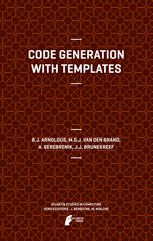

Most ebook files are in PDF format, so you can easily read them using various software such as Foxit Reader or directly on the Google Chrome browser.
Some ebook files are released by publishers in other formats such as .awz, .mobi, .epub, .fb2, etc. You may need to install specific software to read these formats on mobile/PC, such as Calibre.
Please read the tutorial at this link: https://ebookbell.com/faq
We offer FREE conversion to the popular formats you request; however, this may take some time. Therefore, right after payment, please email us, and we will try to provide the service as quickly as possible.
For some exceptional file formats or broken links (if any), please refrain from opening any disputes. Instead, email us first, and we will try to assist within a maximum of 6 hours.
EbookBell Team

4.4
92 reviewsTemplates are used to generate all kinds of text, including computer code. The last decade, the use of templates gained a lot of popularity due to the increase of dynamic web applications. Templates are a tool for programmers, and implementations of template engines are most times based on practical experience rather than based on a theoretical background.
This book reveals the mathematical background of templates and shows interesting findings for improving the practical use of templates.
First, a framework to determine the necessary computational power for the template metalanguage is presented. The template metalanguage does not need to be Turing-complete to be useful. A non-Turing-complete metalanguage enforces separation of concerns between the view and model.
Second, syntactical correctness of all languages of the templates and generated code is ensured. This includes the syntactical correctness of the template metalanguage and the output language. Third, case studies show that the achieved goals are applicable in practice. It is even shown that syntactical correctness helps to prevent cross-site scripting attacks in web applications.
The target audience of this book is twofold. The first group exists of researcher interested in the mathematical background of templates. The second group exists of users of templates. This includes designers of template engines on one side and programmers and web designers using templates on the other side